Key takeaways:
- Recognizing diverse media biases and cross-referencing sources is crucial for a complete understanding of events.
- Reliable news sources shape public perception and decision-making; misinformation can lead to significant consequences.
- Evaluating sources involves considering the author’s expertise, evidence backing claims, and the objectivity of the reporting.
- Utilizing fact-checking resources and established publications enhances the ability to discern trustworthy information from misinformation.
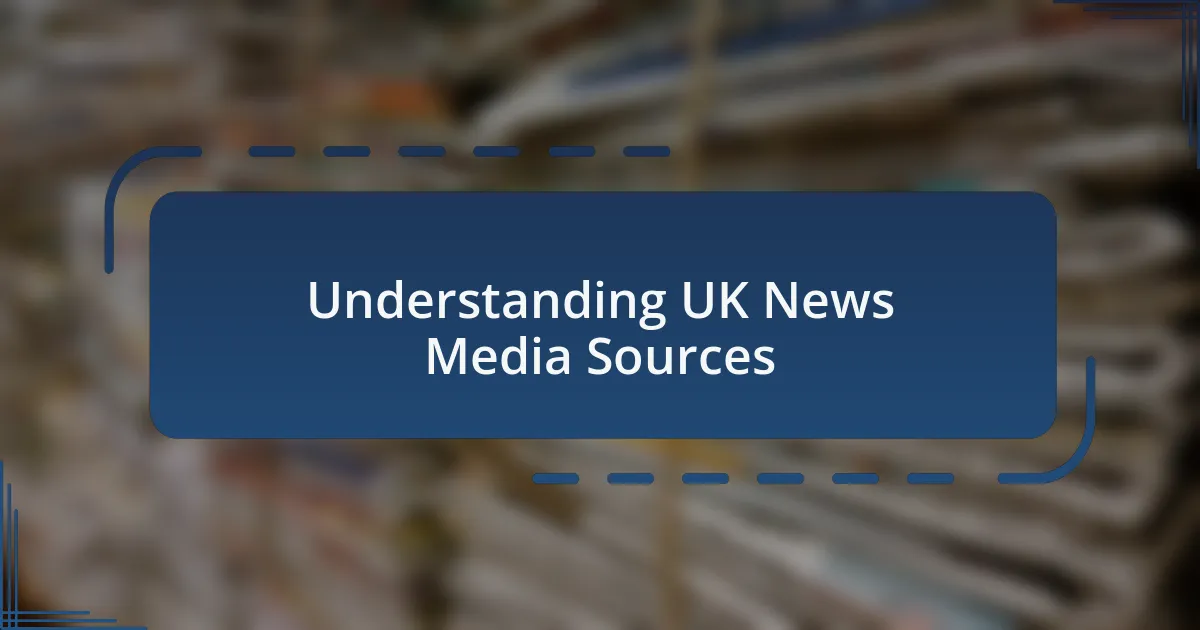
Understanding UK News Media Sources
When I think about UK news media sources, I often reflect on the diverse landscape that shapes our understanding of events. From established newspapers like The Guardian and The Times to dynamic online platforms, each source comes with its own bias and perspective. It’s crucial for readers to recognize these differences; after all, how can we truly grasp the full picture if we only view it through one lens?
I remember a time when I stumbled upon a breaking news story from a little-known website. Initially skeptical, I verified its claims against more reputable sources and discovered that it had indeed reported accurately on an emerging issue. This experience opened my eyes to the importance of cross-referencing news reports. Isn’t it interesting how a story’s authenticity can sometimes reside not in the size of the outlet but in the diligence of our research?
Moreover, understanding UK news media isn’t just about identifying reliable sources; it’s also about being aware of the motivations behind them. For instance, some publications may have political affiliations that color their reporting. I often find myself asking: what interests might be influencing this piece? This level of scrutiny deepens the dialogue we engage in with the media and empowers us as informed citizens.
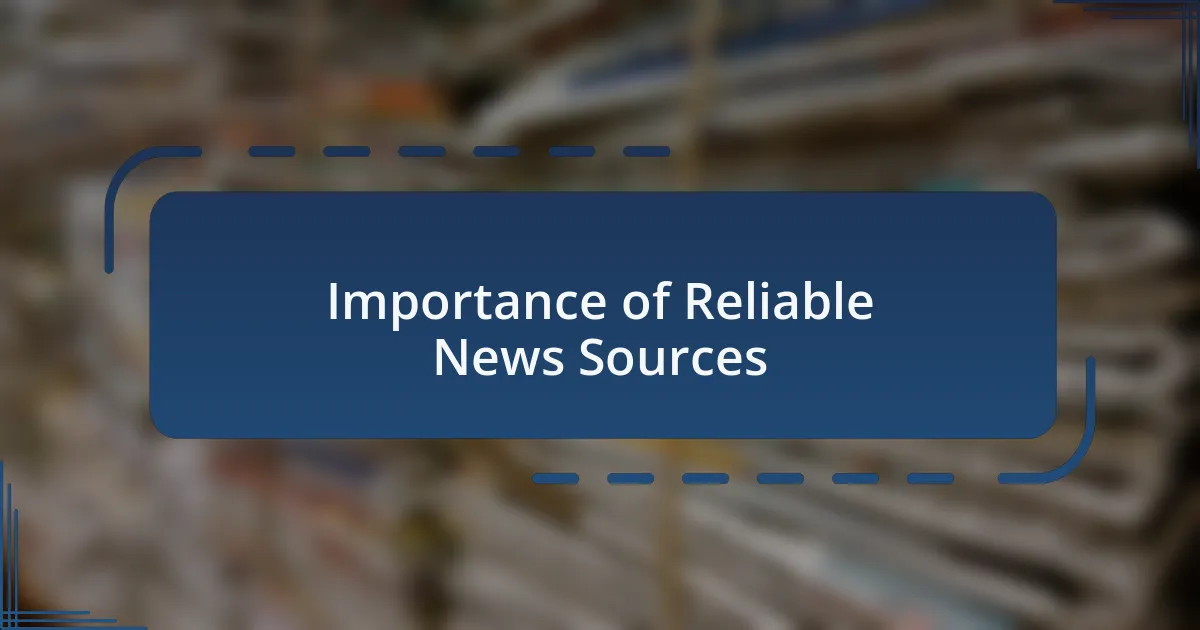
Importance of Reliable News Sources
When I tune into the news, I can’t help but feel a sense of responsibility to seek out reliable sources. I’ve experienced firsthand the confusion that arises when misinformation spreads like wildfire, especially on social media. One day, I clicked on a trending article that claimed a significant political event had occurred, only to find later it was completely fabricated. This incident reinforced my belief that reliable news sources are essential for making informed decisions.
The impact of relying on trustworthy information extends beyond individual understanding; it shapes public opinion and policy. I find it alarming how easily sensationalized stories can sway people’s perceptions, sometimes leading to unjust consequences. Remember when a misleading headline regarding a health issue caused panic buying in supermarkets? This incident reminded me of how critical it is to pursue news from credible outlets, as our choices can have far-reaching effects.
Moreover, the emotional weight of our news consumption is something that shouldn’t be underestimated. I’ve sat around dinner tables, discussing complex issues with family and friends who hold differing views shaped by questionable sources. It dawned on me that when we engage with reliable news, we foster meaningful conversations based on shared facts rather than divisive myths. How can we create a more informed society if we don’t commit to supporting and sharing information from trustworthy sources?
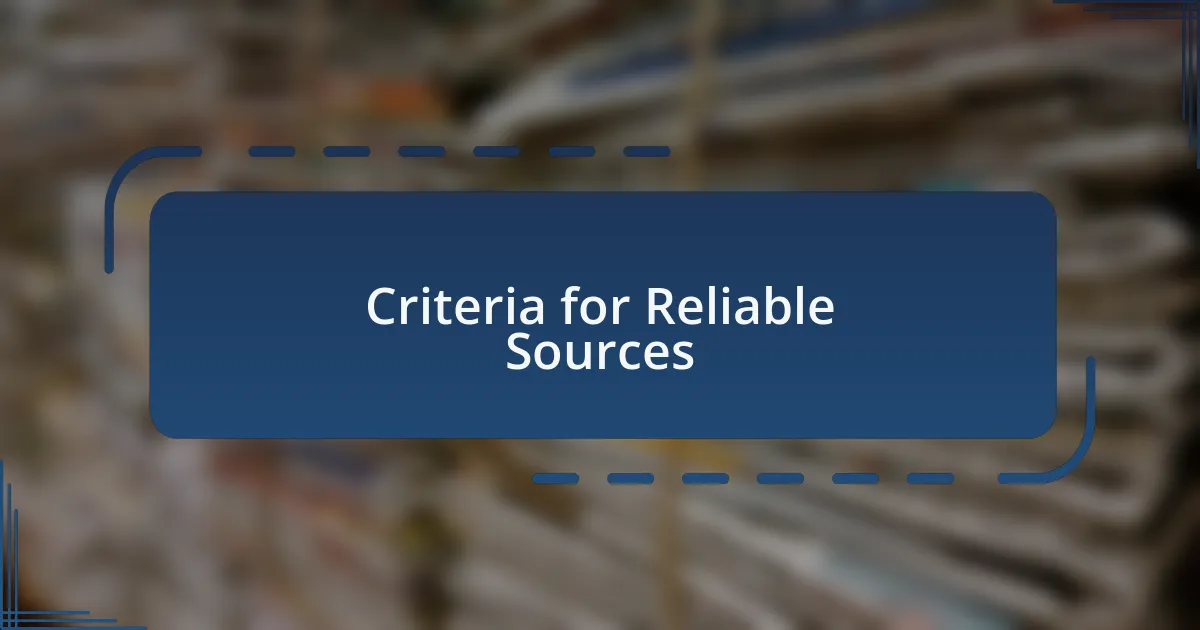
Criteria for Reliable Sources
When evaluating reliable sources, I often consider the author’s qualifications and expertise. For example, I remember reading an article by a journalist who had covered politics for over twenty years. That extensive background not only gave me confidence in the information presented but also made me reflect: doesn’t expertise contribute immensely to the credibility of a source?
Another key criterion is the presence of evidence backing the claims made in an article. I once encountered an intriguing piece about climate change, but it relied solely on anecdotal experiences without citing any studies. That raised a red flag for me. Isn’t it crucial that facts are supported by data, especially when discussing something as significant as our environment?
Lastly, I pay close attention to the objectivity of the content. One time, I stumbled upon a piece that seemed overly biased, painting one side of a political debate without acknowledging opposing viewpoints. It struck me that a reliable source presents multiple perspectives, fostering a balanced understanding. How can we fully grasp complex issues if the narrative is one-dimensional?
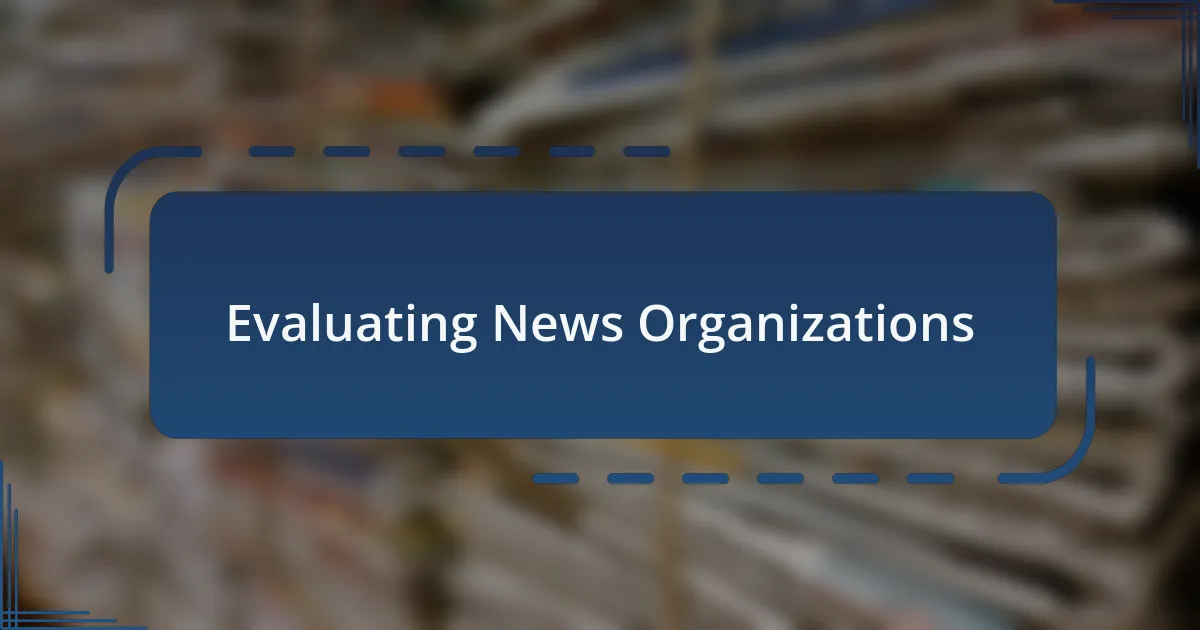
Evaluating News Organizations
When evaluating news organizations, I often start by examining their history and reputation in the field. I recall a time when I checked the background of a lesser-known outlet reporting on a major event. It turned out they had a history of sensationalism and inaccuracies. Doesn’t the track record of a news organization play a vital role in assessing its reliability?
I also find it important to scrutinize their editorial policies. A few years ago, I noticed that a familiar publication I trusted had updated its guidelines to emphasize fact-checking and transparency. This change made me feel more secure when consuming their content. Isn’t it reassuring when an organization takes accountability for the accuracy of its reporting?
Another crucial factor is the diversity of viewpoints within the organization. I once read an investigative report from a news outlet that gathered insights from both sides of a contentious issue. This approach not only enriched the narrative but also made me appreciate the complexity of the topic. Wouldn’t it make sense that an organization open to various perspectives is more likely to deliver honest and balanced journalism?
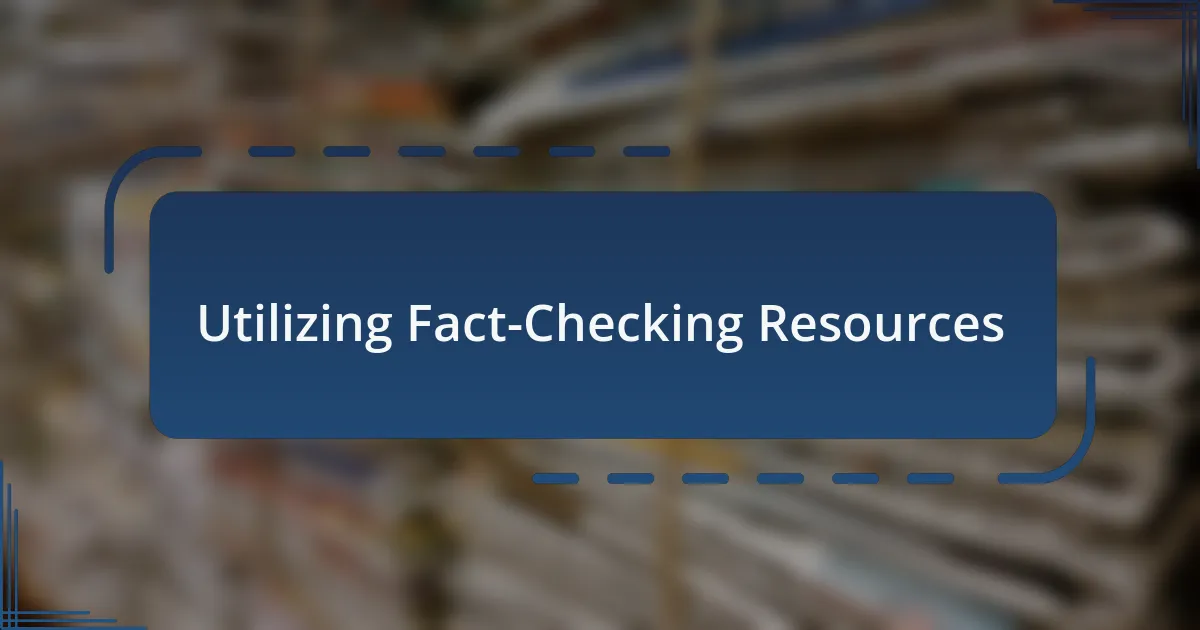
Utilizing Fact-Checking Resources
In my experience, utilizing fact-checking resources is essential when verifying news stories. I remember stumbling upon a claim about a political figure that seemed outrageous. Before sharing it, I turned to a trusted fact-checking website, which confirmed it was exaggerated. How often do we see information blown out of proportion simply because we take it at face value?
I often use platforms like Snopes or FactCheck.org as my first line of defense against misinformation. One time, a viral social media post claimed drastic changes to a UK policy, and I felt compelled to check it out. To my relief, the fact-checkers debunked the claims quickly, reminding me how crucial it is to cross-reference what I read before reacting. Isn’t it empowering to have those tools at our fingertips to help cut through the noise?
Incorporating fact-checking into my routine has transformed how I engage with news. I vividly recall feeling anxious after encountering conflicting reports about a significant health issue. By employing fact-checking resources, I could sift through the misinformation and rely on evidence-based information, which calmed my concerns. Isn’t it amazing how a little research can lead to a clearer understanding of complex issues?
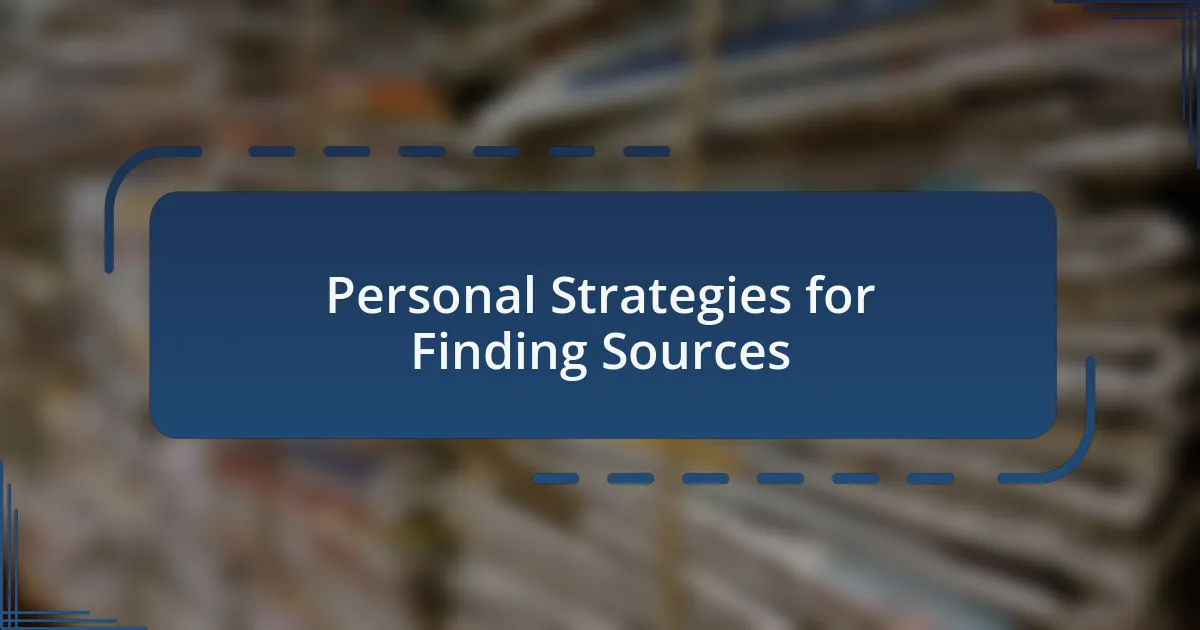
Personal Strategies for Finding Sources
When I’m on the hunt for reliable sources, I often turn to established publications with a long history of journalism. I remember the first time I stumbled onto a trending story from a lesser-known website that seemed to have potential but lacked credibility. After digging deeper, I found that reputable sources had either called out the misinformation or provided additional context. As I often remind myself, the reputation of a publication is a strong indicator of the reliability of its content.
Exploring academic databases has also become a vital strategy for me. One time, while researching a piece on climate change, I accessed peer-reviewed articles that offered solid evidence, shedding light on aspects often misrepresented in mainstream news. It’s fascinating how just a few clicks can lead to a treasure trove of data. Have you ever thought about how academic insights could reshape the way we view these pressing topics?
Networking with knowledgeable individuals in specific fields has proven invaluable in my quest for trustworthy information. I recall reaching out to a friend who works in environmental science for clarity on complex climate policies. Their insights not only enriched my understanding but also provided me with credible sources to refer back to. Isn’t it rewarding to tap into the expertise of others to elevate our own knowledge?
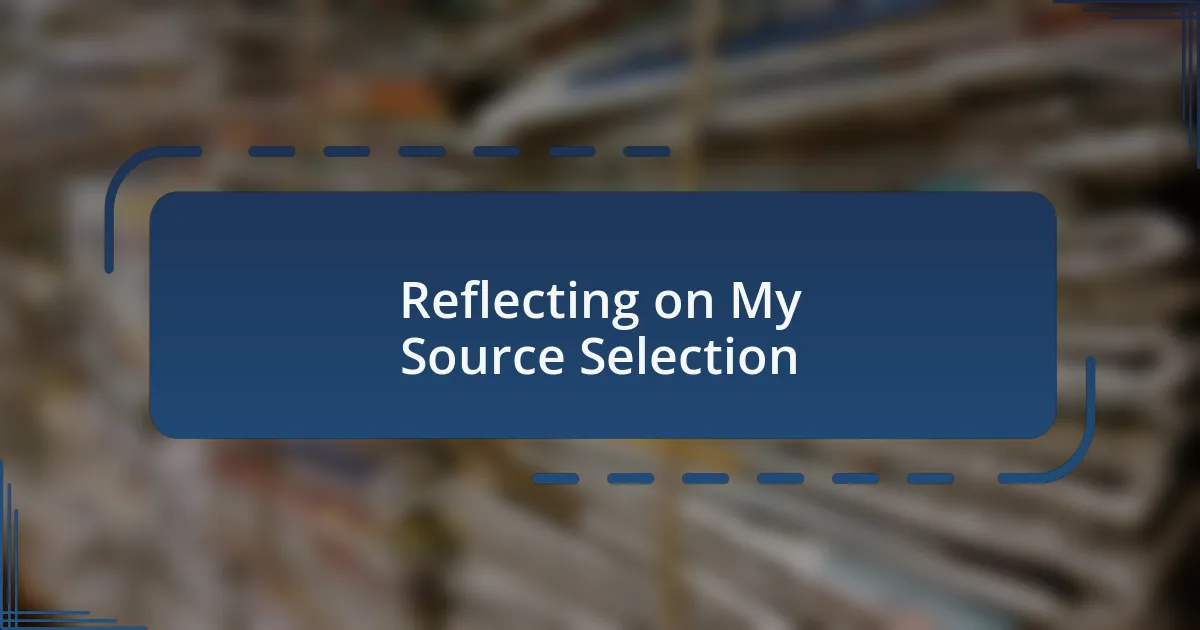
Reflecting on My Source Selection
Reflecting on my source selection often leads me to reconsider how much I trust my instincts. I remember a time when I was eager to write about a breaking news story and thumbing through various articles. I hesitated when an article from a sensationalized site caught my eye. My gut told me to dig deeper, and I ended up finding more balanced reporting in established outlets that had covered the same event. Trusting that initial instinct prevented me from spreading possibly misleading information.
There have been occasions when I’ve had to defend my choice of sources during discussions. I recall a spirited debate with peers about the role of citizen journalism. While I appreciate grassroots reporting, I’ve learned the hard way that it’s essential to weigh the credibility of individual contributors. One particular blog post I came across seemed insightful at first glance, but as I examined the author’s credentials, I realized the insights were based on personal opinion rather than thorough research. Have you ever faced a similar dilemma, weighing the insights of new voices against traditional sources?
Constantly evaluating the reliability of my sources pushes me to be more discerning. I often think about how the landscape of information sources has shifted dramatically with the rise of social media. I reflect on a time when I shared an article I saw trending on Twitter, only to later find discrepancies in the facts presented. That experience ignited a desire to thoroughly scrutinize every source before sharing, ensuring I contribute to a more informed public dialogue. What about you? How do you navigate the sea of information available today?